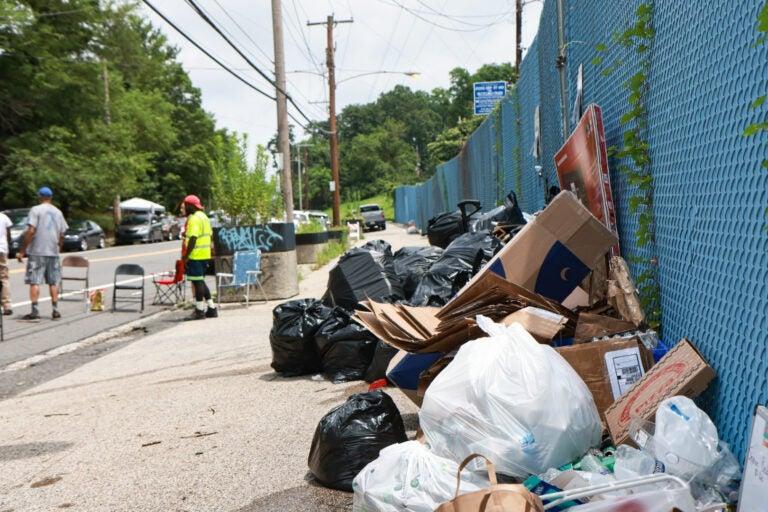Philadelphia Confronts Waste Management Challenges Amid Prolonged Sanitation Workers’ Strike
City Implements Innovative Waste Removal Solutions to Combat Growing Trash Pileup
As Philadelphia enters the third consecutive week of a sanitation workers’ strike, municipal leaders have launched a variety of alternative waste management tactics to address the escalating garbage backlog threatening public health and holiday activities. These initiatives include hiring private waste disposal companies, organizing community volunteer cleanup efforts, and deploying specialized rapid-response teams to sanitize heavily trafficked neighborhoods. City officials emphasize a flexible and proactive approach to maintain cleanliness despite the ongoing labor dispute.
Key components of Philadelphia’s interim sanitation strategy include:
- Collaboration with grassroots organizations: Engaging local neighborhood groups to assist with targeted trash collection and disposal.
- Extended operational hours: Private contractors and volunteers working longer shifts to cover peak waste generation periods.
- Strategic placement of temporary dumpsters: Installing additional waste receptacles in areas identified through recent data mapping as high-accumulation zones.
| Cleanup Initiative | Focus Area | Current Status |
|---|---|---|
| Private Waste Contractors | Downtown Philadelphia | Operational |
| Volunteer Community Drives | West Philadelphia Districts | Ongoing |
| Temporary Dumpster Deployment | South Philadelphia Neighborhoods | Completed |
Public Health Risks and Community Response Amid Trash Collection Delays
The accumulation of uncollected waste has raised significant concerns among Philadelphia residents and health officials alike. Beyond the visual blight, unattended garbage poses serious threats including increased rodent activity, contamination of water sources, and potential outbreaks of diseases such as leptospirosis and salmonella. City leaders are calling on the public to reduce waste generation and securely store trash to minimize pest attraction and health hazards during this critical period.
Primary health risks associated with unmanaged refuse include:
- Proliferation of rats, mice, and insects
- Pollution of groundwater and surface water
- Transmission of infectious diseases linked to pests
| Health Hazard | Underlying Cause | Recommended Prevention |
|---|---|---|
| Rodent Infestation | Exposure to open garbage and food scraps | Use sealed trash containers and limit food waste |
| Water Pollution | Leachate from decomposing waste materials | Proper disposal of hazardous substances |
| Disease Spread | Contact with infected pests and contaminated surfaces | Maintain cleanliness and report sanitation issues promptly |
Temporary Waste Disposal Protocols to Alleviate Overflow During Strike
In light of the ongoing sanitation strike, Philadelphia’s municipal government has issued temporary guidelines aimed at managing waste more effectively and preventing excessive trash buildup over the holiday weekend. These protocols encourage residents to minimize waste production and adhere strictly to scheduled disposal days to ease the strain on limited city resources.
Essential temporary waste management recommendations include:
- Compliance with designated bulk trash pickup schedules: Residents must follow announced collection dates to avoid unnecessary accumulation.
- Utilization of authorized drop-off centers: Selected waste disposal sites will operate with adjusted hours to facilitate safe trash drop-off.
- Enhanced recycling efforts: Separating recyclable materials from general waste is strongly encouraged to reduce landfill pressure.
| Guideline | Details | Implementation Period |
|---|---|---|
| Bulk Waste Collection | Strict adherence to scheduled pickup days; unscheduled bulk trash will not be collected | June 24 – July 4 |
| Drop-off Site Availability | Selected centers open daily from 8 AM to 5 PM | June 25 – July 3 |
| Recycling Emphasis | Encouragement to separate recyclables to reduce landfill volume | Ongoing |
Promoting Eco-Friendly Habits to Reduce Holiday Waste Burden
Environmental specialists stress the importance of adopting sustainable waste management practices during this challenging period for Philadelphia. With sanitation services stretched thin, residents are encouraged to embrace eco-conscious behaviors such as minimizing single-use packaging, composting organic materials, and prioritizing recycling to lessen the environmental and public health impact.
Practical recommendations to support waste reduction include:
- Utilizing reusable shopping bags and containers to cut down on plastic waste.
- Careful sorting of trash to enhance recycling efficiency.
- Donating surplus food and goods instead of discarding them.
- Choosing digital greetings and minimalistic gift packaging to reduce paper waste.
| Eco-Friendly Practice | Environmental Benefit |
|---|---|
| Composting | Decreases landfill volume and enriches soil quality |
| Recycling | Conserves natural resources and reduces pollution |
| Reusable Items | Minimizes disposable waste generation |
Looking Ahead: Community Cooperation and Negotiations Key to Resolution
As Philadelphia braces for the holiday weekend amid the ongoing sanitation workers’ strike, city officials urge patience and community collaboration to navigate the waste management challenges. The success of interim measures and the prevention of severe environmental and health consequences will largely depend on the progress of labor negotiations and public adherence to temporary guidelines. Continuous updates will be provided as the situation evolves.








